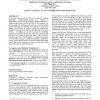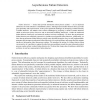1407 search results - page 238 / 282 » Systems Theory Model for Information Security |
JSAC
2007
13 years 9 months ago
2007
— One of the distinctive features in a wireless ad hoc network is lack of any central controller or single point of authority, in which each node/link then makes its own decision...
BRAIN
2010
Springer
13 years 10 months ago
2010
Springer
Cognitive informatics studies the natural intelligence and the brain from a theoretical and a computational approach, which rigorously explains the ms of the brain by a fundamental...
WWW
2002
ACM
14 years 9 months ago
2002
ACM
We describe ongoing work on I2I, a system aimed at fostering opportunistic communication among users viewing or manipulating content on the Web and in productivity applications. U...
PODC
2012
ACM
11 years 11 months ago
2012
ACM
Failure detectors — oracles that provide information about process crashes — are an important ion for crash tolerance in distributed systems. Although current failure-detector...
GAMESEC
2010
13 years 7 months ago
2010
Abstract. Users of mobile networks can change their identifiers in regions called mix zones in order to defeat the attempt of third parties to track their location. Mix zones must ...


